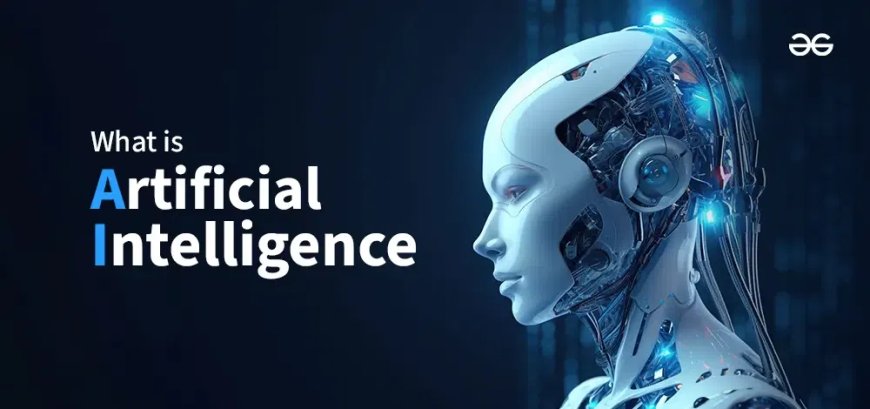Unveiling the Top 10 New Technologies in AI: A Journey into the Future
The term artificial intelligence (AI) describes the process by which machines are programmed to simulate human intelligence in order to carry out tasks that would normally require human intelligence. Learning, thinking, problem-solving, perception, and decision-making are some examples of these tasks. Artificial intelligence (AI) systems are made to interpret data, adjust to new information, and work independently.

In today's rapidly evolving digital landscape, the realm of artificial intelligence (AI) stands at the forefront of innovation. With billions of dollars invested globally, AI continues to reshape industries and redefine the way we live, work, and interact with technology.
The term artificial intelligence (AI) describes the process by which machines are programmed to simulate human intelligence in order to carry out tasks that would normally require human intelligence. Learning, thinking, problem-solving, perception, and decision-making are some examples of these tasks. Artificial intelligence (AI) systems are made to interpret data, adjust to new information, and work independently.
Come along with Joetimenews as we examine the newest developments that are influencing our future as we explore the top ten AI technologies.
1 GPT-3.5/GPT-4: THE EVOLUTION OF CONVERSATIONAL AI
In practice, ChatGPT can help you compose written pieces, such as personal correspondence, marketing materials, or webpage content. You can ask ChatGPT to help you write a grocery list, create a meal plan, design an exercise program, describe art, summarize books, complete math problems, suggest code, or translate between languages, among many other things.GPT is a large language model that powers generative artificial intelligence. Users can submit requests to the app, and the AI model will consult its training data set to return a unique response to the prompt.
2 GENERATIVE ADVERSARIAL NETWORKS (GANS): REDEFINING CREATIVITY
What is GAN?
GAN stands for Generative Adversarial Network. It’s a form of machine learning model called a neural network, specially designed to simulate the structure and function of a human brain. For this reason, neural networks in machine learning are sometimes referred to as artificial neural networks (ANNs). This technology is the basis of deep learning, a subcategory of machine learning (ML) capable of recognizing complex patterns in varying data types such as images, sounds, and text.
3 EXPLAINABLE AI (XAI): BRIDGING THE GAP BETWEEN HUMANS AND MACHINES
A collection of procedures and techniques known as explainable artificial intelligence (XAI) enables human users to understand and have faith in the output and outcomes produced by machine learning algorithms.
The term "explainable AI" refers to an AI model's predicted effects and possible biases. It contributes to defining model correctness, fairness, transparency, and decision-making results driven by AI. When implementing AI models into production, an organization needs to be able to explain AI in order to gain the confidence of its stakeholders. Explainability in AI aids in an organization's adoption of a responsible development strategy for AI.
In an age where trust and transparency are paramount, Explainable AI (XAI) emerges as a critical component of AI development. By providing insights into AI decision-making processes, XAI ensures accountability and fosters human-AI collaboration. With a projected market value of $1.2 billion by 2027, XAI is set to empower users and drive AI adoption across industries.
4 NATURAL LANGUAGE PROCESSING (NLP): EMPOWERING COMMUNICATION
Natural language processing (NLP) is a form of artificial intelligence (AI) that allows computers to understand human language, whether it be written, spoken, or even scribbled. As AI-powered devices and services become increasingly more intertwined with our daily lives and world, so too does the impact that NLP has on ensuring a seamless human-computer experience.
5 HEALTHCARE: TRANSFORMING PATIENT CARE WITH AI
Artificial intelligence (AI) healthcare is the use of machine learning (ML), natural language processing (NLP), deep learning (DL), and other AI-enabled tools to assist and, ideally, improve the patient experience, including diagnosis, treatment, and outcomes.
AI's integration into healthcare has led to unprecedented advancements in diagnostics, treatment, and telemedicine. We examine how AI algorithms are improving disease detection, drug discovery, and remote patient care. With the global telemedicine market projected to reach $286.22 billion by 2030, AI is poised to revolutionize healthcare delivery and improve patient outcomes.
6 BIOMETRICS: SECURING IDENTITY WITH AI
Biometric technologies powered by AI are reshaping identity verification and authentication methods. From fingerprint recognition to facial recognition, we explore how AI is enhancing security and convenience in various sectors.
With innovations like gait recognition and DNA-based biometrics on the horizon, biometrics promise to redefine the future of identity management.
7 REINFORCEMENT LEARNING: TRAINING AI TO MAKE DECISIONS
Reinforcement Learning (RL) emerges as a cornerstone of autonomous systems and decision-making algorithms. We delve into its applications in autonomous vehicles, robotics, and gaming, highlighting its role in optimizing real-world processes and driving innovation across industries.
8 PREDICTIVE AI ANALYTICS: ANTICIPATING THE FUTURE WITH DATA
Predictive AI analytics combine the power of machine learning and data science to forecast trends and behaviors. From predictive maintenance to personalized marketing, we explore how AI-driven analytics are empowering businesses to make informed decisions and stay ahead of the competition.
9 CHATBOTS AND VIRTUAL ASSISTANTS: ENHANCING CUSTOMER EXPERIENCE
Artificial intelligence (AI) software that mimics user interactions and digital discussions is called a chatbot. Chatbots can converse in a natural language (spoken, written, or both) over the phone as well as on websites, mobile and messaging apps, and other platforms.
Recent developments in AI technology have made chatbots incredibly intelligent, enabling them to perform tasks beyond simply using preset templates to answer particular questions.
10 SALES AND MARKETING: DRIVING GROWTH WITH AI
AI marketing: what is it?
Artificial intelligence (AI) marketing, to put it broadly, is a marketing strategy that makes use of sophisticated computation to analyze data and gain a deeper understanding of your target audience. AI has shown to be helpful in examining consumer behavior and offering insights that can help you improve communication through all of your marketing platforms.
Plenty of professionals have gone all-in on embracing the maximized efficiency of this new technology. As per Influencer Marketing Hub, 61.4% of marketers employ artificial intelligence (AI) in their marketing endeavors, and 71.2% of them think that AI can surpass humans in their work. More than half—54.5%—believe that AI is likely to greatly enhance their marketing efforts overall.
What's Your Reaction?














































































